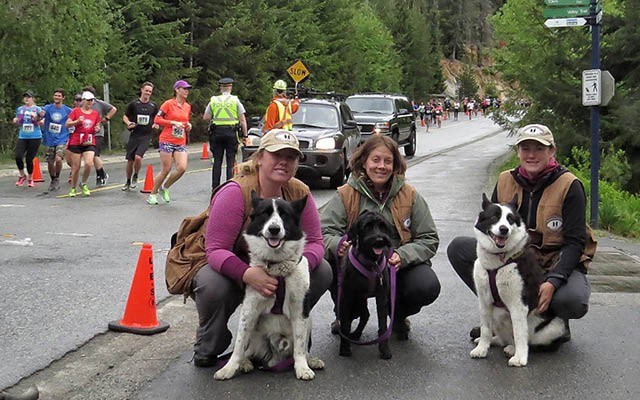Of the issues many Whistler residents have raised in recent years with the Ironman Canada triathlon, wildlife management consistently landed near the top of the list.
That's no surprise considering the 2015 event saw a sow bear and her cubs relocated from the community after bluff-charging a competitor. That was followed last year by another family of bears that had become agitated during the race, leading to the inadvertent death of a cub after it was captured by the Conservation Officer Service (COS).
This year, Ironman organizers took the step of bringing in two dog handlers from the Wind River Bear Institute (WRBI) to work with local agencies on bear management during the July 30 event. And, outside of the short-distance relocation of a male bear, there were no incidents to speak of, according to the COS.
"It was a huge improvement this year over last year," said Sylvia Dolson, head of the Whistler Get Bear Smart Society. "I think that in itself, just the success of Wind River coming into help, shows that it works."
The WRBI first began offering "bear aversion" to events in the region at the 2016 Pemberton Music Festival. The organization also lent assistance to the most recent editions of the Whistler Half Marathon and Tough Mudder, thanks in part to a pair of unprecedented grants from the Community Foundation of Whistler (CFOW).
"This is the first time we were presented a grant application for something like this, and it was hotly debated," explained CFOW director Carol Coffey.
In the end, the CFOW decided in favour of granting a total of $4,100 between the two events to "demonstrate to the community, to event organizers and to local government that there's more we can be doing to prevent human-bear conflicts at events," Coffey added.
Working alongside conservation officers, WRBI handlers sweep the event grounds with their specially trained dogs for any signs of bear activity.
"The dogs will bark when they smell a bear, so that allows us to flag (problem) areas," explained Lori Homstol with the WRBI. "That helps us to clear the trail before the racers come in so that if there is any bear encounter, hopefully it's with us and not with the race participants."
Using the information gleaned from dog handlers like Homstol, conservation officers can then "dictate our patrol path and our response if there's a presence of bears," noted Sgt. Simon Gravel with the COS. "It's definitely a helpful addition to our capacity."
In the Rocky Mountain town of Crowsnest Pass, Alta., one conservation officer has spent the better part of the past two decades using dogs to help with wildlife management. John Clarke, district fish and wildlife officer, said he's seen the number of bear conflicts "plummet" since he adopted his first Karelian Bear Dog in 2001.
"We have a totally different program down here. I think it's probably the best in ... North America," he posited.
But the dogs are only one part of Clarke's approach. He has enlisted volunteers from the community who patrol the valley for wildlife activity and notify him when issues arise. The group also holds public talks and works with residents to secure attractants.
The group's efforts have been such a success that Clarke claims the bears have been conditioned to the point that they can actually recognize the volunteers.
"The bears are smart; they've figured out if they see that volunteer driving around that they've got to get the hell outta there because John's coming next with the dogs," he said.
It's a distinct shift in culture from Whistler, where many residents are reluctant to contact the COS for fear it will lead to a bear being killed.
"(The dogs) are a big component of that because the community totally accepts the dogs as their own," Clarke said. "What I've noticed is that if it's a quiet time and I'm walking dogs in problem areas, people see me doing that and they say, 'Thank god, they're being proactive.'"
In B.C., the COS employs dogs for a variety of reasons, such as tracking coyotes, but they're rarely if ever used to shepherd bears — something Gravel believes isn't likely to change anytime soon.
Part of the challenge, Clarke said, is the time and commitment required to train the dogs.
"The thing is, when you get a dog, it's 24-7," he said. "It's difficult finding a handler who will commit 12 years to a dog."
After close to 20 years doing bear aversion, Clarke is convinced in the effectiveness of his approach and believes other jurisdictions should adopt a similar strategy.
"When people say aversion doesn't work, you know what? It does if you do it properly and you have the commitment, the resources and others helping you," he mused.
"We've got to stop thinking about the old way of doing things because people aren't putting up with it anymore."
For more information on the WRBI, visit www.beardogs.org.




